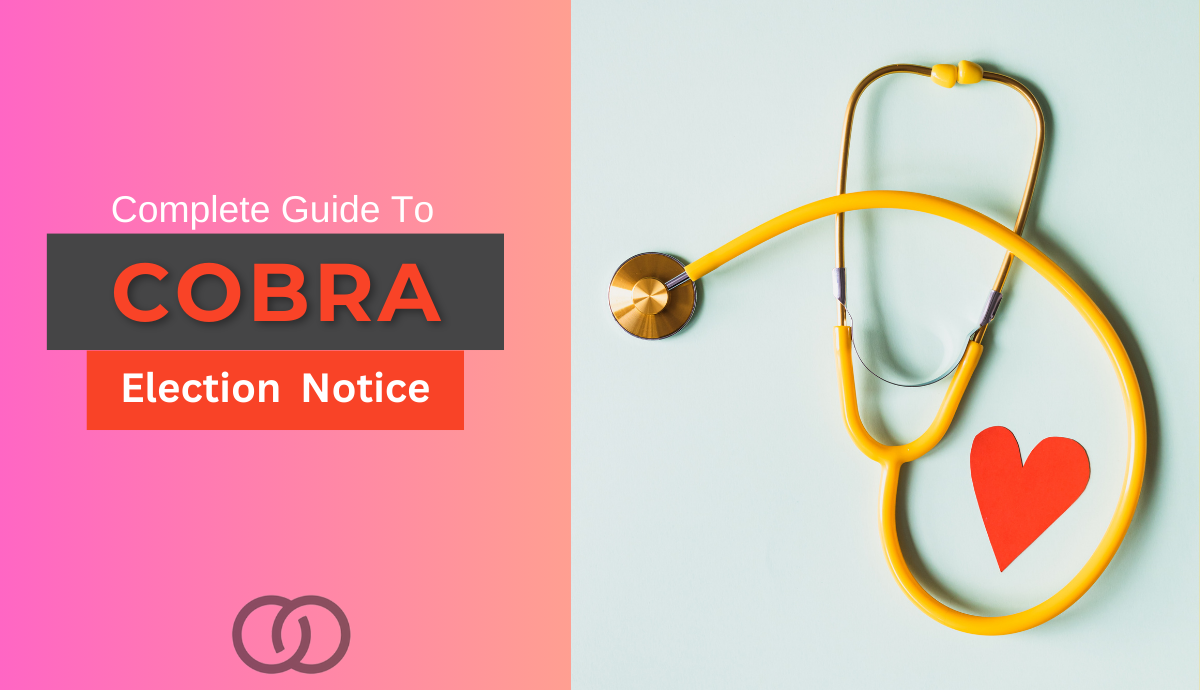According to the Consolidated Omnibus Budget Reconciliation Act (COBRA), employers must provide continued health benefits to him/her at their own expense when an employee loses their job. They must also provide the employee with a COBRA election notice, a document stating the employee’s COBRA insurance entitlement, and the steps they should take if they elect to continue getting the benefits.
The Consolidated Omnibus Budget Reconciliation Act (COBRA) gives workers and their families who lose their health benefits the right to choose to continue group health benefits provided by their group health plan for limited periods of time under certain circumstances such as voluntary or involuntary job loss, reduction in the hours worked, transition between jobs, death, divorce, and other life events. Qualified individuals may be required to pay the entire premium for coverage up to 102% of the cost to the plan.
Understanding the COBRA Election Notice
An employer required to give their eligible former employees COBRA insurance should alert their group health plan administrator within 30 days of terminating an employee. Once notified, they have 14 days to alert the specific employee.
Every eligible beneficiary must get COBRA election notices. For example, an employee whose employer-offered health insurance also covers their spouse must be made aware of their rights to continue the health benefits.
The COBRA election notice must involve specific pieces of information, such as:
- An explanation for what should be done to elect COBRA
- Ways to notify their plan administrator if they want to do so
- The deadline for selecting the option to receive COBRA insurance
The notice must also cover a few other details, including:
- An explanation for what should be done to elect COBRA
- Ways to notify their plan administrator if they want to do so
- The deadline for selecting the option to receive COBRA insurance
- The date when coverage will start and the cost of premium
- When, how, and where to send premium payments
- The plan administrator’s identity
- The duration you may continue to receive coverage
- Issues that may cause early termination of COBRA insurance
Every employer is liable to send COBRA election notices within the given timeframe. If an employer fails to do so, the employee can seek help from an employment lawyer in Los Angeles and learn more about the options available.
Knowing Your Rights
Knowing your rights is crucial when an employer fails to adhere to the requirements for providing COBRA alerts. Here’s what you should remember.
Your Employer May Need to Cover Specific Medical Expenses
There may be a duration when you will be uninsured if your employer does not give you a COBRA notice on time. If you sustain medical expenses during this time that would otherwise be covered under COBRA if you got the notice, you are likely going to recover the expenses.
A Los Angeles employment lawyer can provide the assistance you need, as they know the relevant laws and regulations surrounding an employer’s responsibilities in these cases.
Your Employer Can be Penalized
An employer who misses the deadline to give COBRA election alerts may need to pay a civil penalty of $110 daily. It continues until the situation is resolved.
The court may adjust the penalty depending on various factors. For instance, employers who failed to give COBRA notices to employees in previous cases as per the set deadline had to pay lesser fines when an employee did not get the notice acquired other coverage, and/or did not sustain medical expenses in that non-coverage duration.
You Are Entitled to COBRA Coverage Termination Alerts
Irrespective of the reason, you must also get a notice when COBRA insurance coverage gets terminated. You may be entitled to compensation if you sustain considerable medical expenses but did not get an alert and believe you still had the insurance. However, situations may vary from one case to another.
Contact a lawyer specializing in COBRA insurance if you think your employer violated a COBRA election notice. Your lawyer will assess the situation to determine whether you have a case. If your case has merit, they will help you get what you are owed.



